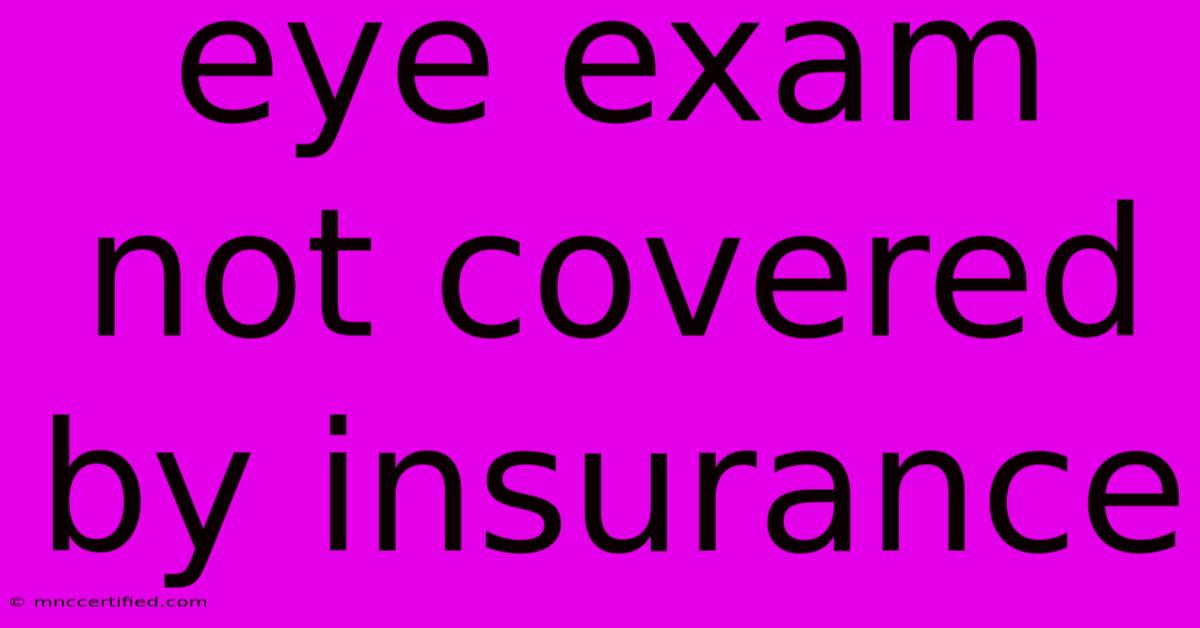Eye Exam Not Covered By Insurance

Table of Contents
Eye Exam Not Covered by Insurance: What to Do Next
Discovering that your eye exam isn't covered by insurance can be frustrating. Many insurance plans have limitations on vision coverage, leaving individuals facing unexpected costs. This comprehensive guide outlines the common reasons for uncovered eye exams, strategies for reducing expenses, and alternative options to ensure you receive the necessary eye care.
Why Your Eye Exam Might Not Be Covered
Several factors can contribute to an eye exam being excluded from your insurance coverage. Understanding these factors is the first step in navigating this situation effectively.
Insufficient Coverage:
- Limited Vision Benefits: Many insurance plans offer limited vision benefits, often covering only a basic eye exam every one or two years. If you exceed the allowed frequency, the extra exam may not be covered.
- Exclusions for Specific Services: Some plans exclude specific eye care services like comprehensive eye exams, contact lens fittings, or specialized tests like glaucoma screenings, even if part of a routine check-up. Always review your plan's detailed benefit summary.
- Pre-existing Conditions: Pre-existing eye conditions, such as glaucoma or macular degeneration, might not be fully covered, especially if treatment is needed beyond a basic exam. Check your plan documents for specific limitations.
- Network Restrictions: If you visit an ophthalmologist or optometrist outside your insurance network, your exam may not be covered, or you'll face significantly higher out-of-pocket costs. Using an in-network provider is crucial for maximizing coverage.
- Deductibles and Co-pays: Even with coverage, you may still have to meet your annual deductible or pay a co-pay before the insurance company starts contributing to the cost of your eye exam.
Understanding Your Insurance Policy:
The most crucial step is thoroughly reviewing your insurance policy documentation. Pay close attention to:
- Covered Services: Identify precisely what eye care services your plan covers and any limitations.
- Frequency of Coverage: How often are you entitled to a covered eye exam?
- Provider Network: Determine which ophthalmologists and optometrists are included in your plan's network.
- Deductibles and Co-pays: Understand the financial responsibilities before insurance coverage kicks in.
Reducing the Cost of Your Uncovered Eye Exam
Several strategies can help manage the cost of an uncovered eye exam:
Negotiate with Your Provider:
Many eye care providers are willing to work with patients facing financial difficulties. Don't hesitate to ask about:
- Payment Plans: Inquire about payment plans to break down the cost into manageable installments.
- Discounts: Some providers offer discounts for cash payments or for specific groups (e.g., seniors, students).
- Financial Assistance Programs: Ask if the provider participates in any financial assistance programs for low-income individuals.
Explore Alternative Payment Options:
- Health Savings Account (HSA): If you have an HSA, these funds can be used to pay for qualified medical expenses, including eye exams.
- Flexible Spending Account (FSA): Similar to HSAs, FSAs can also cover eligible healthcare costs. However, remember that FSA funds typically expire at the end of the plan year.
- Credit Cards: Use a credit card that offers rewards or cashback on healthcare expenses. Remember to pay off your balance promptly to avoid accumulating interest.
Finding Affordable Eye Care
If your insurance doesn't cover your eye exam, consider these options:
- Vision Discount Plans: These plans offer discounted rates on eye exams and eyewear from participating providers. While not insurance, they can be a cost-effective alternative.
- Community Health Clinics: Many community health clinics provide affordable or free eye care services, particularly for low-income individuals.
- University Eye Clinics: University eye clinics often offer lower prices than private practices, with students and faculty performing exams under supervision.
Prioritizing Eye Health
Regular eye exams are vital for maintaining good vision and detecting potential eye diseases early. Even if faced with unexpected costs, prioritize your eye health. By understanding your insurance coverage, exploring cost-reduction strategies, and researching alternative options, you can ensure you receive the necessary eye care without compromising your financial well-being. Remember to always confirm details directly with your insurance provider and healthcare professionals.

Thank you for visiting our website wich cover about Eye Exam Not Covered By Insurance. We hope the information provided has been useful to you. Feel free to contact us if you have any questions or need further assistance. See you next time and dont miss to bookmark.
Featured Posts
-
Spike Has A Life Insurance Policy
Nov 19, 2024
-
Technology Insurance Company Naic
Nov 19, 2024
-
Get Sidemen Charity Match 2025 Tickets
Nov 19, 2024
-
Russia North Korea Troop Deployment
Nov 19, 2024
-
Kristie Mewis Sam Kerr Expecting
Nov 19, 2024